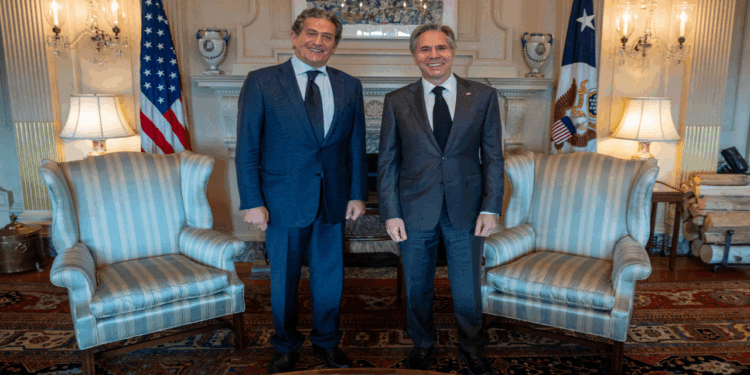The three-way battle for the Democratic Party’s future foreign policy direction has started.
Is it time for the Democratic Party to reassess its approach toward foreign policy? In several recent essays, James P. Rubin, a former State Department official in the Clinton and Biden administrations, has made the case for asserting American power and values abroad. An imaginative and forceful thinker, Rubin is on the comeback trail, triggering fresh disputes over the direction of the Democratic Party in foreign affairs. In a new Democratic administration, he would be a prime candidate for secretary of state or national security adviser.
There are essentially three foreign policy camps among the Democrats. The first camp consists of progressives who want to adopt an overtly critical stance toward Israel and move away from overt militarism, promoting human rights and preventing conflict. The second camp consists of former Obama and Biden administration officials, such as former national security adviser Jake Sullivan (who also served as director of the Policy Planning Staff during the Obama administration). Its credo is lawyerly deliberation, process, and credentials, hiring the brightest graduates from the best schools, all in the hopes of avoiding a fresh calamity such as the Iraq War.
Then there is a third camp consisting of former Clinton administration officials who disdain the innate caution of the Obama veterans. They take a more broadly assertive view of the efficacy of American power, and their likely standard-bearer is former ambassador to Japan and mayor of Chicago, Rahm Emmanuel, who recently visited Iowa to test the 2028 presidential waters. When it comes to foreign affairs, Emmanuel has been a proponent of aid to Ukraine and of an “economic NATO” to counter China.
Rubin, it seems safe to say, represents one of the most intriguing foreign policy thinkers in this camp. He was a key part of former Secretary of State Madeleine Albright’s team during the Clinton administration, which spearheaded the interventions in the Balkans. Rubin did not occupy as prominent a role during the Biden administration. Still, as head of the Global Engagement Center (established in 2011), he worked assiduously to counter America’s adversaries in cyberspace, including issuing a widely publicized, detailed report on Chinese disinformation and propaganda activities in America and elsewhere. Overall, the center countered multifarious efforts by American foes to disseminate falsehoods.
Writing in The Washington Post, Rubin stated, “We were able to identify the hidden hand of our adversaries and inform governments, the private sector and the public that a particular series of news stories or claims were effectively dictated by the Chinese Communist Party or the Kremlin. Once aware of the source of news, listeners, readers and viewers could decide for themselves whether to believe the outrageous anti-American claims.” The Trump administration disbanded the center in April.
As part of his efforts during the Biden administration, Rubin also sought to establish the framework for a lasting peace in the Gaza Strip. In an op-ed for The New York Times, Rubin argues that a plan he helped to devise might serve as a blueprint for the Trump administration. He suggests that the White House should authorize former British prime minister Tony Blair to work in tandem with the US Central Command to establish an international force to maintain order in the Gaza Strip. Rubin also advises that the commander role should be exercised by Indonesia, which has indicated that it would be prepared to send troops to the region.
Above all, Rubin admonishes that “The Trump administration does not appear to have thought through those hard questions. If there is one thing I learned working on this issue during the two Clinton administrations and the Biden administration, it is that progress in the Middle East requires intense, sustained, and expert attention from the highest levels of government.”
In the journal Liberties, Rubin amplifies his views in a vigorous essay titled “Two Slogans, Three Presidents, and the Fight for American Foreign Policy.” He maintains that Democrats must glance backwards to look forward. In exhuming the Clinton record, Rubin lauds his activist foreign policy—intervention in the Balkans, NATO expansion, the Oslo Accords, and the US-North Korea nuclear deal of 1994. Rubin’s disdain for Obama-era foreign policy could hardly be more palpable:
The foreign policy of the Obama years was marked above all by a dire case of Iraq War Syndrome. Obama and his team did all they could to hype his early remark at a rally in Chicago in opposition to Bush’s decision to invade Iraq. It was a stupid war, he said. And that, of course, led to the slogan that defined his foreign policy over two terms. On Air Force One, Obama famously told the White House press corps that his guiding principle was, ‘Don’t do stupid sh**.’ The cautionary example of Iraq became a kind of obsession-compulsion for Obama and his policymakers, as if it was all you needed to know about American power and the world.
By contrast, Rubin largely exempts the Biden administration from criticism (though he does acknowledge its missteps during the botched withdrawal from Afghanistan). But Rubin does not seek a mere restoration of the Biden era. Invoking the Truman administration, he sets his sights on creating a policy of dual containment of Russia and China, buttressed by an extensive alliance system led by America.
Rubin does not believe that the moment has arrived to pronounce obsequies for the American century. Instead, he seeks to prolong it. In firing the first shot in the Democratic foreign policy wars, he may soon discover whether he is outgunned or on the winning side.
About the Author: Jacob Heilbrunn
Jacob Heilbrunn is editor of The National Interest and is a nonresident senior fellow at the Atlantic Council’s Eurasia Center. He is the author of They Knew They Were Right: The Rise of the Neocons, which The New York Times included on its 100 notable books of the year in 2008, and America Last: The Right’s Century-Long Romance with Foreign Dictators. He has written on both foreign and domestic issues for numerous publications, including The New York Times, The Washington Post, The Wall Street Journal, Financial Times, Foreign Affairs, Reuters, Washington Monthly, and The Weekly Standard. He has also written for German publications such as Cicero, Frankfurter Allgemeine Zeitung, and Der Tagesspiegel.
Image: Department of State / Public Domain.


















